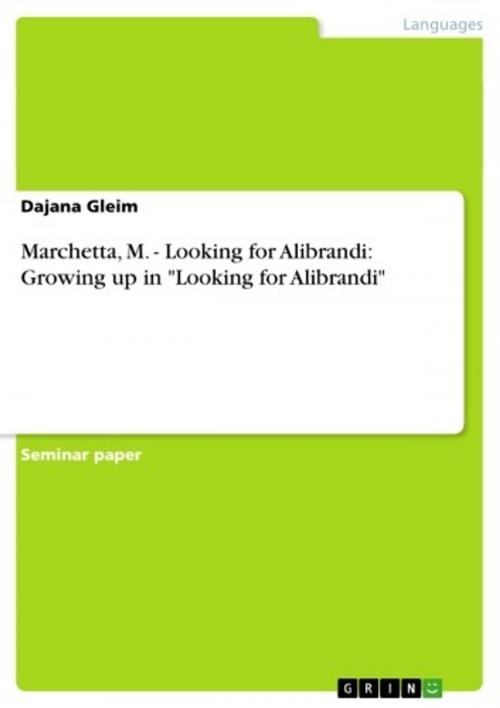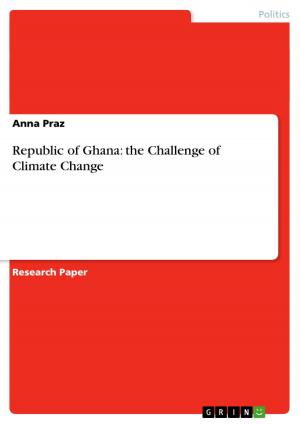Marchetta, M. - Looking for Alibrandi: Growing up in 'Looking for Alibrandi'
Looking for Alibrandi: Growing up in 'Looking for Alibrandi'
Fiction & Literature, Literary Theory & Criticism, British| Author: | Dajana Gleim | ISBN: | 9783638270090 |
| Publisher: | GRIN Publishing | Publication: | April 21, 2004 |
| Imprint: | GRIN Publishing | Language: | English |
| Author: | Dajana Gleim |
| ISBN: | 9783638270090 |
| Publisher: | GRIN Publishing |
| Publication: | April 21, 2004 |
| Imprint: | GRIN Publishing |
| Language: | English |
Seminar paper from the year 2004 in the subject English - Literature, Works, grade: 1,5 (A), Karlsruhe University of Education (Institute for Foreign Languages and Language Research), course: Growing up Ethnic in Australia, language: English, abstract: The novel Looking for Alibrandi written by Melina Marchetta was first published by Penguin in 1992. By now it has been published in Denmark, Italy, Germany, Spain, Norway and Canada (cf. Tudball & White 1999: 11). It has received numerous prestigious awards, for example, it became '1993 Children's Book of the Year (for older readers)' and 'Multicultural Book of the Year' (cf. Bednarek 2000: 39f.). The novel points out topical aspects, like multiculturalism, immigration, social differences, but also themes like love, friendship and family life. It is the story of a teenage girl who grows up with an Italian-Australian identity and faces the highs and lows of teenage life. In an interview (cf. Scan 1993: 1), Melina Marchetta talked about her reasons for writing for young adults and said that she 'finds this group fascinating, identifies strongly with it and likes the stage teenagers are at of being so open to change and growth, so vulnerable yet so exuberant'. She thinks that she is very similar to them in tastes. For this reason, she is able to write about teenagers with truth and in the language they really use. Another point is that she is a young author, she was born in 1965. Consequently, she is not much older than the teenagers she describes. The essential concern Melina Marchetta persues in her writing is 'growth through the interaction of characters'. The novel Looking for Alibrandi reveals her concern and is about Josephine Alibrandi's way to freedom through the interaction of her family, friends and other significant people. The following essay deals particularly with the aspect of growing up in a multicultural society.
Seminar paper from the year 2004 in the subject English - Literature, Works, grade: 1,5 (A), Karlsruhe University of Education (Institute for Foreign Languages and Language Research), course: Growing up Ethnic in Australia, language: English, abstract: The novel Looking for Alibrandi written by Melina Marchetta was first published by Penguin in 1992. By now it has been published in Denmark, Italy, Germany, Spain, Norway and Canada (cf. Tudball & White 1999: 11). It has received numerous prestigious awards, for example, it became '1993 Children's Book of the Year (for older readers)' and 'Multicultural Book of the Year' (cf. Bednarek 2000: 39f.). The novel points out topical aspects, like multiculturalism, immigration, social differences, but also themes like love, friendship and family life. It is the story of a teenage girl who grows up with an Italian-Australian identity and faces the highs and lows of teenage life. In an interview (cf. Scan 1993: 1), Melina Marchetta talked about her reasons for writing for young adults and said that she 'finds this group fascinating, identifies strongly with it and likes the stage teenagers are at of being so open to change and growth, so vulnerable yet so exuberant'. She thinks that she is very similar to them in tastes. For this reason, she is able to write about teenagers with truth and in the language they really use. Another point is that she is a young author, she was born in 1965. Consequently, she is not much older than the teenagers she describes. The essential concern Melina Marchetta persues in her writing is 'growth through the interaction of characters'. The novel Looking for Alibrandi reveals her concern and is about Josephine Alibrandi's way to freedom through the interaction of her family, friends and other significant people. The following essay deals particularly with the aspect of growing up in a multicultural society.















